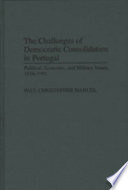
The Challenges of Democratic Consolidation in Portugal
By - Manuel, Paul Christopher
Floor
-
Floor 1
Published
-
Praeger, Westport, Conn., 1996
ISBN 10 - 0275948498
ISBN 13 - 9780275948498
Book Status
-
1 Qnty Available with us.
Subject
-
Portugal
Shelf No
-
15
Call Number
-
320.9469 MAN
Physical Description
-
xvi, 103 pages ; 25 cm
Notes
-
Include Index